Something bad has happened on the space station. One of my Alters, a genetic clone with different simulated memories of an altered life path, warned me something like this could happen. I had tried to do what he asked, but we ran out of time — the sun that this planet orbits is all-oppressive, and once sunrise hits, we’ll all burn to death. I didn’t have a chance to see if his mechanical hack would work, and now, it’s too late.
I look at the clock — the real life-clock, the one on my phone next to my dog, and not the constantly ticking magenta timer in the bottom left-hand corner of The Alters. I don’t have enough time to replay the last few days, or maybe even week, in-game and likely still finish in time to meet the review embargo, but I desperately want to go back and redo it. This meta situation felt surprisingly apropos of The Alters, a new management-sim, story-driven space adventure by 11 Bit Studios, out tomorrow on June 13.
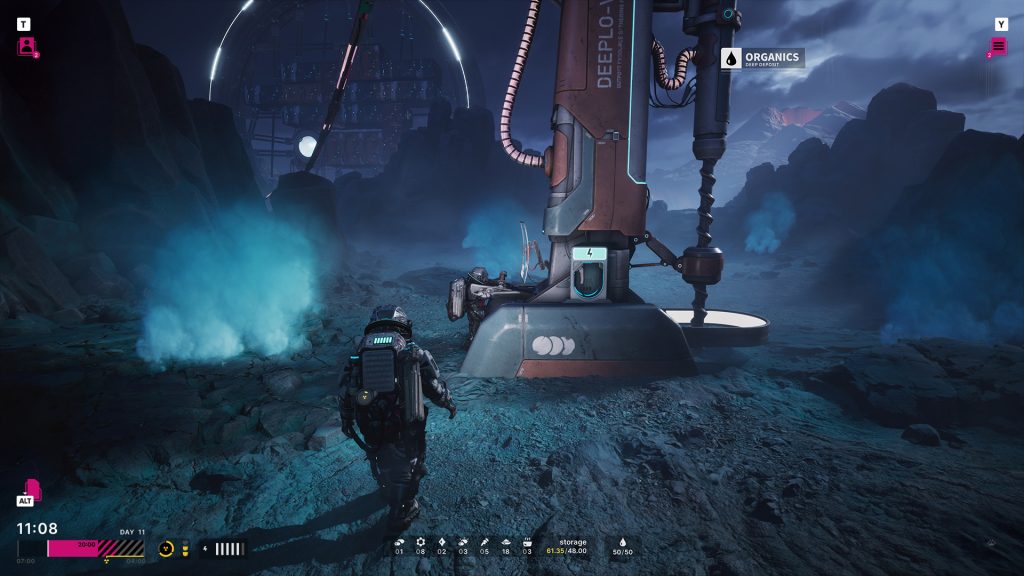
Survival of the Fittest
The game opens on Jan Dolski, an astronaut on a mining expedition looking for a mysterious mineral called Rapidium that has crash-landed on a distant planet. The rest of his crew has perished. Jan, now the de facto captain of a solo mission, makes it to the mobile base, a huge vertical metal circle that looks like the one in The Martian on which everyone else besides Matt Damon escapes on. But Jan can’t operate this behemoth alone. With the guidance of shadowy corporate superiors via an intergalactic comms link, he creates his first Alter using Rapidium.
Jan makes duplicates of himself, but with changes along his mind map to create someone with the technical know-how to fix the ship. Jan’s possible Alters — of which there are ten — are significantly different in appearance, skill, and personality. There’s the version of him who kept pursuing academia and didn’t sell out to corporate; another who was a more supportive husband and his wife never divorced him. The Alters each play a part in leading the oddball crew to survival.
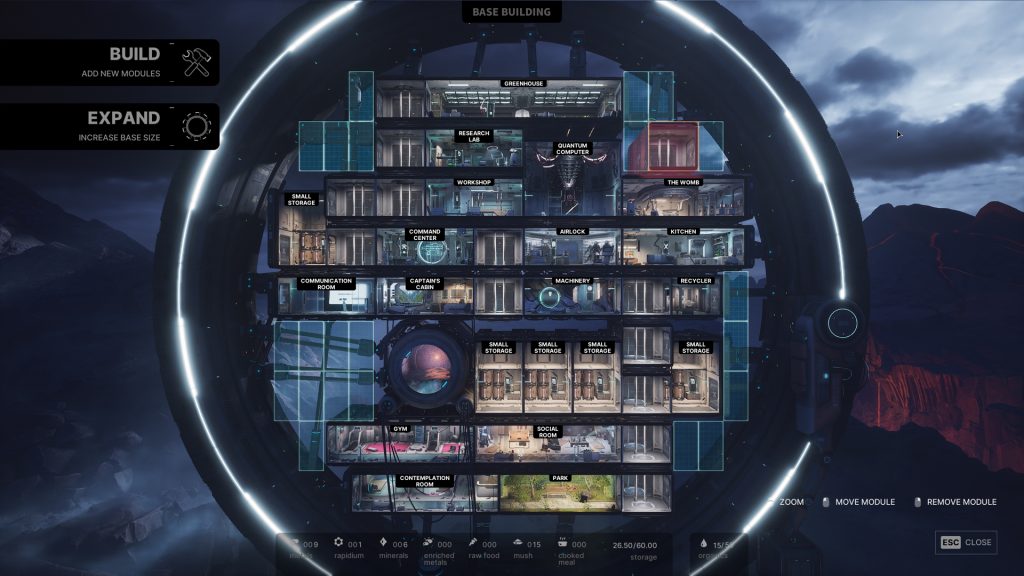
There’s a ticking clock on the planet — the sun is never too far behind. Captain Jan Dolksi and his Alters (conveniently named things like Jan Scientist) must make it to a rendezvous point in time to get rescued. Their journey is beset with a variety of strange space phenomena, and they still have to survive on a daily basis.
The result is that The Alters is a truly addicting management sim. It has the perfect amount of resources to monitor — enough to be a challenge, but not enough to be impossible. In comparison, 11 Bit Studios’ last game, Frostpunk 2 (which I reviewed here) had a dizzying amount that I couldn’t keep up with. With The Alters, I felt both empowered and challenged.
Each day in-game is a hyper-achiever’s dream — players have to balance assigning Alters, managing resources to create critical items like radiation filters, befriending (or arguing with) your Alters, rearranging modules on the space base, phoning the corporate overlords, exploring the planet’s surface (running, climbing, using a cool space flashlight to destroy floating space time continuum orbs… it makes sense in the game), and trying to do the right thing.
Right, As in Correct, Or Right, As in Good?
The Alters reminds me of a TED Talk I watched over a decade ago that changed my life; I still think about it. Philosopher Ruth Chang, PhD, shares how to reframe big, scary decisions as opportunities to live our values. Through Jan Dolski’s Alters, I reflected on what makes me me. Who am I if not for my choices?
Very early on in playing, I was reminded of AppleTV’s hit show Severance in which people split their mind so they have a work-persona and a home-persona, with no memories shared. The central tensions of that show work because it’s the same person with different realities; it’s fascinating to see this struggle executed so well in a video game.

For example, the “real” Jan Dolski (and who is to say the Alters aren’t real, at this point?) escaped from his troubled home life — an abusive father and sickly mother — by burying himself in his studies so he could go to a college far away. He wasn’t there when his mother passed away from cancer, and it haunts him. In comparison, one of his Alters stayed around, and he was there for her until the end. He got a blue collar job in town and developed a drinking problem; meanwhile, in this reality, Jan had moved out, found financial independence, and got married. Jan is jealous, hungry for the Alter’s time with their mother. That Alter, meanwhile, is disgusted by Jan for abandoning her.
What was the right choice? Different people would give different answers, and The Alters explores these questions well. Jan and his Alters approach not only interpersonal turmoil differently, but also how to best handle life-threatening challenges on the planet. As the main story progresses, Jan faces bigger and bigger moral quandaries, and the player must make difficult choices.
“The Alters is a truly addicting story-driven space adventure… It’s a dream for hyper-achievers and for anyone who asks, ‘What if…?’”
Try Again
I have very few qualms with The Alters. If I was being picky, I’d say that not all of the Alters feel totally equal. I loved that all of them are given detailed backstories and interesting approaches to life on the base. However, not all of them are as integral on the base. The Scientist, for example, is absolutely key to survival, whereas you can probably make do without The Miner (even though I’d rather hang out with the latter than the former). Some Alters felt less nuanced, occasionally leaning into stereotypes — for example, a worldly Alter who says vague, wise things inexplicably had an American Southern accent when none of the other Alters do, and there’s a psychiatrist who is into psychadelics and wears a beanie.
All versions of Jan are voiced by Alex Jordan (who voiced Rook in Dragon Age: The Veilguard and Mr. Hands in Cyberpunk 2077). Jordan has to do a lot of work of differentiating Jan across Alters. For the most part, he succeeds. It’s a big ask, and when some dialogue acting felt a little flat or basic, I found it easy to forgive him. He’s holding a lot! The Alters do truly feely unique, and I cared about each and every one of them.
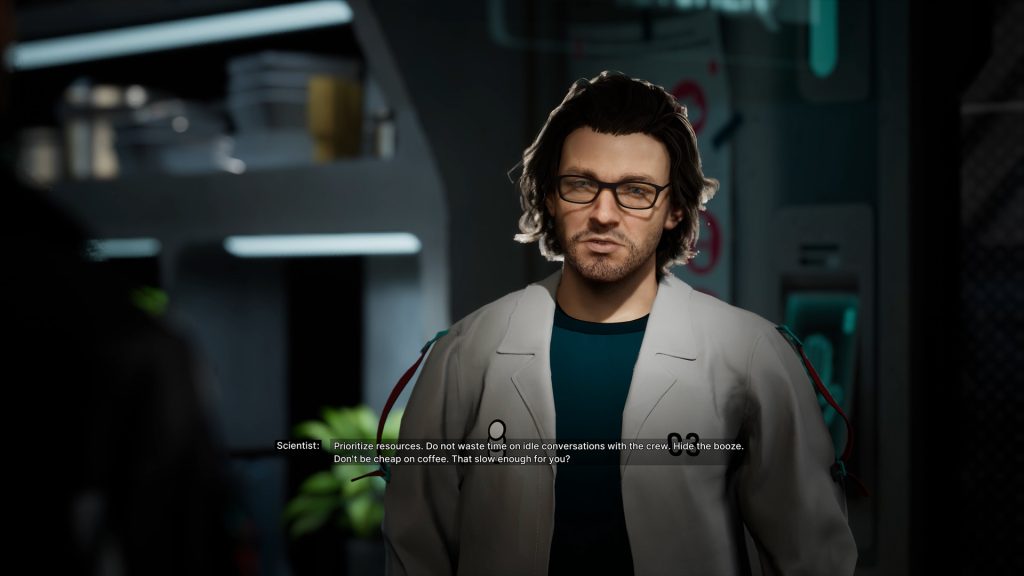
There are a few typos or missing punctuation marks in the subtitles, which is unsurprising given all of the branching narrative and conversation topics. These errors didn’t bother me too much given that the text is largely supplemental. This also might be the fault of localization work, as 11 Bit Studios is based in Poland.
The most notable issue that I experienced is that my pre-release build was a bit buggy. For example, the game frequently failed to properly load content on new days or changes in space station locations. However, this wasn’t a real problem — the game auto-saves each night and between locations, so I just loaded the same day over again. Other bugs, such as small status alert pop-ups that didn’t fade until the next day, weren’t serious enough to bother me. I’m sure much of this will be handled in the official release or a Day 1 Patch.
The Alters is not ground-breaking territory in terms of concept. The plot might sound familiar — Bong Joon Ho’s survival comedy Mickey 17 released early this year starring Robert Pattinson as a multiple-cloned guy on a frozen planet. Over a decade ago, there was a similar science fiction film, but more of a mystery — Moon (2009) starring Sam Rockwell. Humanity has long been interested with the ideas of creation and multiplication — from Mary Shelley’s seminal 1818 novel Frankeinstein to Jurassic Park to Storm Troopers to even the creation of Eve from Adam in the Bible. Still, The Alters excellently executes the premise which felt naturally compelling in the video game format.
Is The Alters Good?
The short answer: Yes. It’s one of the best games I’ve played this year, right up there with Clair Obscur: Expedition 33 and Blue Prince. 2025 is turning out to be an excellent year for indies and AAs. 11 Bit Studios has done a lot with a relative little — (e.g. scrappy choices like painted portraits with narration instead of cut-scenes work well enough). The Alters promises a lot of replayability with different choices depending on which Alters you make and when, and what you do once you have them. Playtimes will vary as well, but I think the average playthrough will be in the 27 to 40 hour range. It’s an excellent mid-sized game for a great price point ($34.99 is a steal, in my opinion).
The long answer: As I close this review, I want to return to how I opened it — the Alter’s idea that I was sure would change everything.
I kept thinking about that one moment where I could’ve done something different. Unlike in real life, I was able to rewind and try a different path by loading a past save and replaying two days in-game. I’m better at the game now, moving faster through hazards on the planet’s surface, knowing exactly which resources I need, familiar with all the gadgets at my disposal. But I couldn’t get it done fast enough.
Fine, I thought, I’ll just have to go back further. I rewound a whole week. This Alter had been injured, so maybe if I healed him faster, I could get the idea sooner. But this time, I had a new problem — I couldn’t get my Alter to come up with the same idea again.
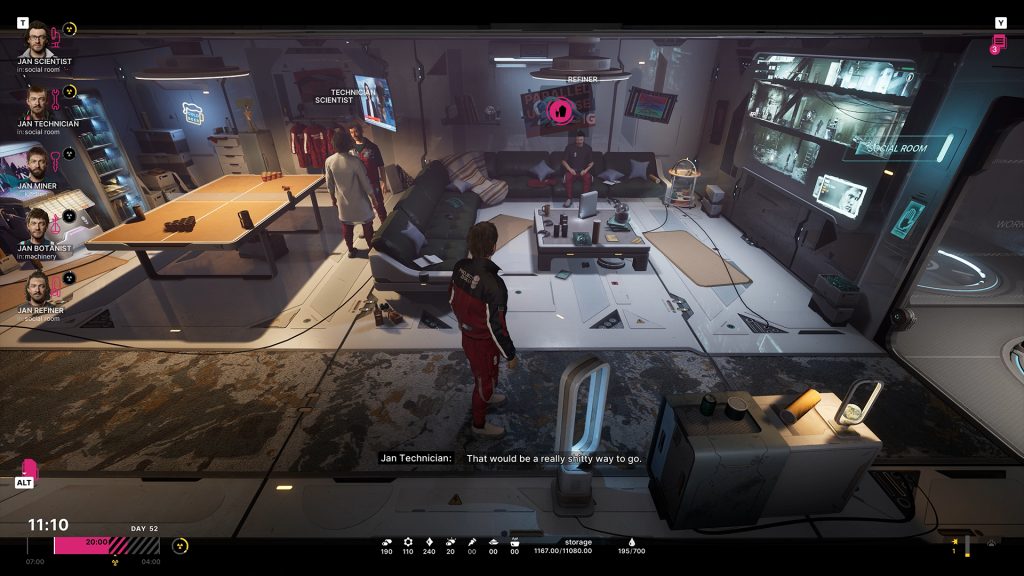
I replayed the same section probably four times. (I was really desperate to change this one outcome, which, if/when you play it, you’ll probably know which one I mean and why I wanted to make a difference so badly.) Maybe if I gave him better food, he’d be more motivated and inspired. Or what if I didn’t assign him to the outposts, and he spent more time in-base, talking to that other Alter?
But no matter what I did, the game didn’t trigger the Alter to suggest it. Other conversations played out on the base instead, but not the one that I was sure would change everything. It was impressive how organic the game felt, that it was responsive, changing, the combinations never quite the same… but I was also annoyed. I wanted the stars to align, and I was irritated that the game wouldn’t replicate the same exact situation.
In the end, I accepted that I couldn’t force my dream scenario — it just what it was. I kept playing through on the game. The bad thing happened. It made me sad. I kept playing, frustrated with both my inability to get over it and what I perceived was a shortcoming of the game for not enabling my side quest. Days progressed. I accepted the bad thing as part of my life, as part of my Alter’s lives, and soldiered on.
Then, much later, that one Alter suggested the idea again. I laughed. So, it turns out that the idea wasn’t related to the bad thing after all. I had been so sure. I still pursued his plan anyway, even knowing I couldn’t go back and change this particular past. Sometimes, things just happen, and we have to do our best to deal with it. The Alters deftly balances the fun of gaming with heavy existential questions, echoing back to 11 Bit Studios’ first big hit in 2014, This War of Mine.
My real-life experience of playing The Alters did a surreal, beautiful job of replicating themes in the game itself. We can’t change the past. We can impact the future by changing our present. We might always wonder, What if, instead, I had…?
I’ve had a lot of those soul-searching questions over the past few years, reflecting on paths untaken. When I’m feeling low, I second guess myself, occasionally spiraling, feeling trapped. But when I’m feeling up, I see it for what it is — that my life is a chain of events where I have chosen to define myself and my values. Who will I become? Only I will know.
Score: 9.5/10
The Alters, developed and published by 11 Bit Studios, releases on June 13, 2025, for PC, PlayStation 5, and Xbox Series X/S. MSRP: $34.99. Version reviewed: PC (via Steam Deck).
Disclaimer: A review code was provided by the publisher.
Amanda Tien (she/her or they) loves video games where she can pet dogs, punch bad guys, make friends, and have a good cry. She started writing for the site in 2020, and became an editor in 2022. She enjoys writing about mystery games, indies, and strong femme protagonists.
Her work has also been published in Unwinnable Monthly (click here to read her cover feature on Nancy Drew games), Salt Hill Journal, Poets.org, Litro Magazine, Public Books, and more. She was the Co-Founder and Editor-in-Chief of Columbia University's Culinarian Magazine, and served for two years as the Managing Editor of Aster(ix) Literary Journal.
She recently graduated with a MFA (Master of Fine Arts) in Creative Writing from the University of Pittsburgh. Her writing, art, graphic design, and marketing work can be viewed at www.amandatien.com.
She does not post a lot on social, but you can find her on X and on Instagram.









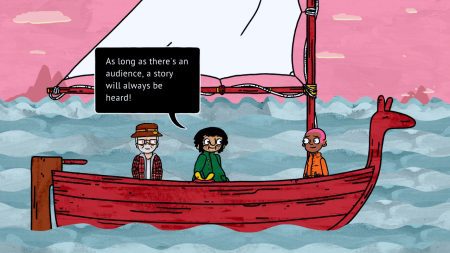
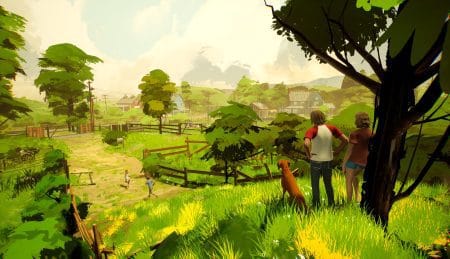

oooo did you feel any Citizen Sleeper vibes while playing this? It kinda reminds me of that game.
I definitely got a bit of the space cyberpunk/corporate subterfuge energy! The closest vibe is really THE MARTIAN but with a lot more existential crisis lol.